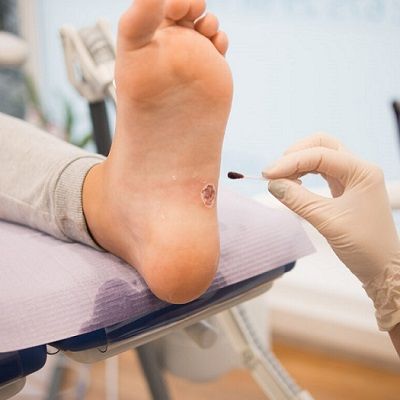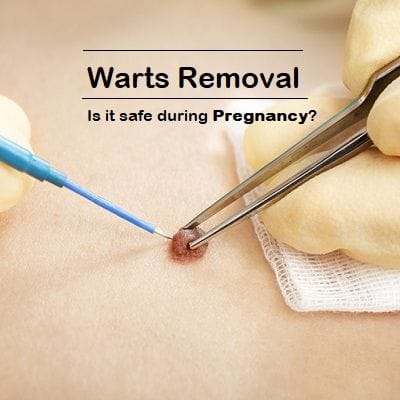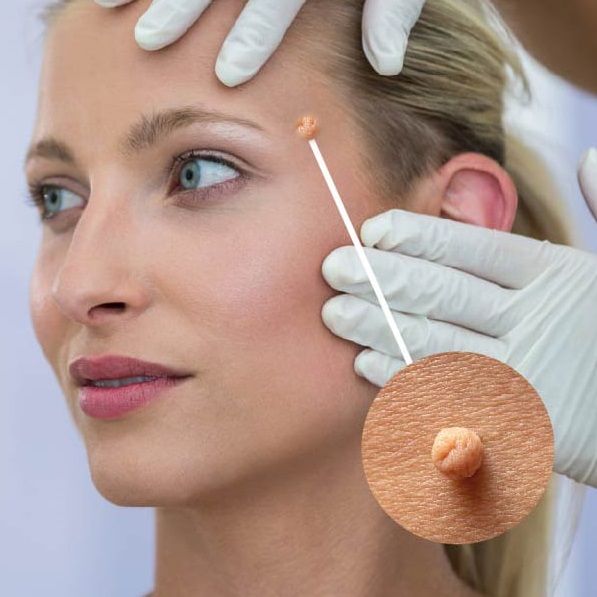
Warts are skin and mucous membrane (mouth or genital) growths produced by over 100 different strains of the human papillomavirus (HPV). The virus induces the top skin layer to stretch. A plantar wart is a wart that grows on the base of the foot. It may seem and feel like a callus. Plantar warts can be minor or significant, covering the whole sole. They are generally painless and resolve on their own. However, they might take many months to heal.
Warts are often spread by individual contact. The virus is not exceptionally infectious, but it can cause an illness if it enters through a simple skin breach. Warts can also spread to other parts of your body in the same way. The virus is seldom transmitted by touching an infected person’s item.
What Exactly Are Warts, And What Generates Them?
A wart is a skin development produced by some strains of the human papillomavirus (HPV). HPV affects the top layer of the skin and generally enters the body through a break in the skin. The virus infects the top layer of skin to develop quickly, resulting in the formation of a wart. Most warts disappear on their own within a few months or years.
Warts can occur everywhere on the skin and can be of any form or size. Typical warts, for instance, occur most frequently on the hands, although they can appear elsewhere. Plantar warts expand on the underside of the feet.
Can Warts Be Removed Forever?
Warts can be eradicated in the genital region; however, the viral infection that generates the warts is incurable. This implies that warts may return even when they have been removed.
How Are Warts Transmitted?
Warts can be transferred by direct interaction with human papillomavirus. Contacting the wart and then touching another area of your body might reinfect you. Sharing towels, razors, or other personal objects might spread the virus to another individual. After being exposed to HPV, it might take months of gradual development beneath the skin before you see a wart.
You are unlikely to get a wart each time you come into contact with HPV. Some individuals are more susceptible to developing warts than others.
What Are The Signs And Symptoms?
Warts may be found in a variety of forms and sizes. A wart can be a hump with a rough surface or a flat and smooth surface. To feed blood to the wart, tiny blood veins develop into its center. These arteries may appear as black specks in the wart’s core in both standard and plantar warts.
Warts are typically not painful. However, a wart that grows in a pressure point, like on a finger or the bottom of the foot, can be uncomfortable. Get help from the mole removal in Dubai.
How Are Warts Identified?
By simply glancing at a skin growth, a doctor can typically identify if it is a wart. Your doctor may examine a sample of the wart under a microscope (a skin biopsy). If it is unclear if the growth is a wart, this procedure may be used. It may also be performed if a skin growth is darker than the adjacent skin, is an uneven area on the skin, bleeds, or is vast and rapidly expanding.
How Are They Handled?
The majority of warts do not require treatment. However, if you have warts that are uncomfortable or growing, or if you are worried by the way they appear, the following are the most suitable warts treatment for you:
- Using a home remedy like salicylic acid or duct tape. These are available without medication.
- Applying a more potent medication to the wart or having a medicine injection into it.
- Freeze the wart (cryotherapy).
- Surgical removal of the wart (electrosurgery, curettage, laser surgery).
Removing a Skin Tag may not always work. Even if a wart diminishes or disappears, it may reappear or spread to other places of the body. This is because most therapies eliminate the wart but not the virus that produces it.
Prevention:
- Avoid direct contact with warts to lower the chance of plantar warts. This includes warts on your skin. After touching a wart, thoroughly wash your hands.
- Maintain your feet clean and dry at all times. Change your footwear and socks regularly.
- Avoid wandering near swimming pools and changing rooms barefoot.
- Avoid picking at or scratching warts.
- Do not use the same abrasive board, sandpaper, or nail trimmer on warts that you do on good skin and nails.
Final Words!
If the wart gets uncomfortable or does not disappear with home cures, you should consult a doctor. If you have diabetes, poor flow or loss of feeling in your feet, symptoms of infection, or a compromised immune system, you should consult your doctor about warts.
Plantar warts are atypical and curable. No one treatment is always successful. Although you might be capable of treating them at home, more severe instances will necessitate treatment at your physician’s office. So if you have painful warts, then contact a warts removal clinic in Dubai.











